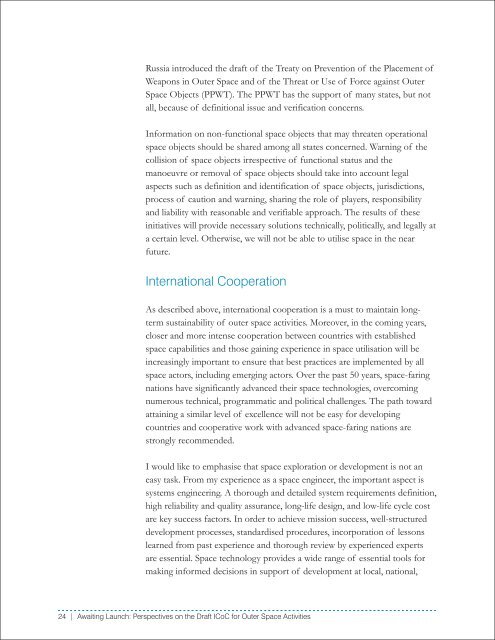AwaitingLaunch_1397728623369
AwaitingLaunch_1397728623369
AwaitingLaunch_1397728623369
Create successful ePaper yourself
Turn your PDF publications into a flip-book with our unique Google optimized e-Paper software.
Russia introduced the draft of the Treaty on Prevention of the Placement of<br />
Weapons in Outer Space and of the Threat or Use of Force against Outer<br />
Space Objects (PPWT). The PPWT has the support of many states, but not<br />
all, because of definitional issue and verification concerns.<br />
Information on non-functional space objects that may threaten operational<br />
space objects should be shared among all states concerned. Warning of the<br />
collision of space objects irrespective of functional status and the<br />
manoeuvre or removal of space objects should take into account legal<br />
aspects such as definition and identification of space objects, jurisdictions,<br />
process of caution and warning, sharing the role of players, responsibility<br />
and liability with reasonable and verifiable approach. The results of these<br />
initiatives will provide necessary solutions technically, politically, and legally at<br />
a certain level. Otherwise, we will not be able to utilise space in the near<br />
future.<br />
International Cooperation<br />
As described above, international cooperation is a must to maintain longterm<br />
sustainability of outer space activities. Moreover, in the coming years,<br />
closer and more intense cooperation between countries with established<br />
space capabilities and those gaining experience in space utilisation will be<br />
increasingly important to ensure that best practices are implemented by all<br />
space actors, including emerging actors. Over the past 50 years, space-faring<br />
nations have significantly advanced their space technologies, overcoming<br />
numerous technical, programmatic and political challenges. The path toward<br />
attaining a similar level of excellence will not be easy for developing<br />
countries and cooperative work with advanced space-faring nations are<br />
strongly recommended.<br />
I would like to emphasise that space exploration or development is not an<br />
easy task. From my experience as a space engineer, the important aspect is<br />
systems engineering. A thorough and detailed system requirements definition,<br />
high reliability and quality assurance, long-life design, and low-life cycle cost<br />
are key success factors. In order to achieve mission success, well-structured<br />
development processes, standardised procedures, incorporation of lessons<br />
learned from past experience and thorough review by experienced experts<br />
are essential. Space technology provides a wide range of essential tools for<br />
making informed decisions in support of development at local, national,<br />
24 | Awaiting Launch: Perspectives on the Draft ICoC for Outer Space Activities








